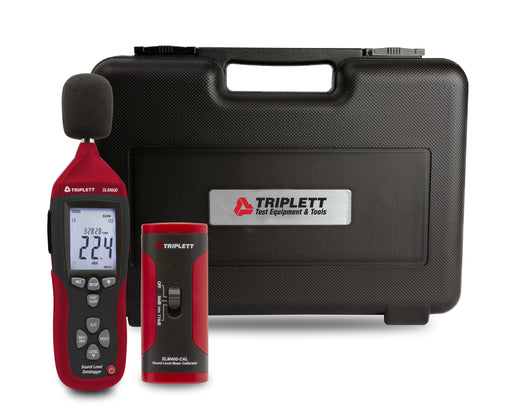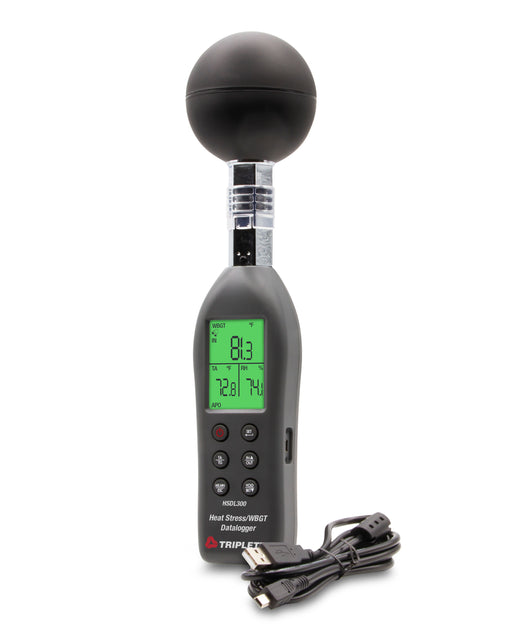Know More About Triplett Industrial Dataloggers
Importance of Data Loggers in Industrial Units
Here are some points explaining why data loggers are significant across various industries:
- Data analysis: This is sought by any business to ensure a product or system has the right temperature, pressure, humidity, or the required factors. The data collected by these loggers helps in analyzing the past and current readings with regards to immediate decision making, report generation, and more. Also, the real-time data can be immediately viewed and analyzed using data analysis software, which helps reduce defects and fix issues on time.
- Condition monitoring: Industrial machines and processes are set to perform at different temperatures, pressure, humidity levels, and other environmental parameters. Hence, data loggers are used to ensure all these parameters are within the required limits. Safety is also an aspect here.
- Alarms: If a data logger senses any levels above or below the required range, they issue alerts through LED lights as well as audible alarms.
How Data Loggers Work?
Our industrial and commercial data loggers have sensors that sense the required parameters, and the values are stored in the device memory. Sensors send analog signals to the device controller or monitor which convert them to digital signals and values that can be displayed on the screen. These sensors are accurately calibrated to measure the parameter in the required range. They can be connected to external storage devices such as USBs to collect the data and transfer it to the required device such as a computer. There is a time stamp for each record which helps monitor the readings over the period. You can adjust the settings in terms of maximum and minimum values based on each parameter, temperature range, alarm controls, preferred units of values, and more. Many of our models are digital and have memory or storage capacity up to 20000 data points. They come with LCD color display screens and audiovisual alarms. Some of these models allow compatible third-party software for remote access. They can be powered by either batteries or an electric power source. All these features make them easy to use.
Types of Data Loggers We Offer
While most of our data loggers are designed to measure multiple parameters, here are some types we offer:
- Voltage and Current Data Loggers: These are used to monitor and record current and voltage levels in various industrial applications. They are capable of recording as well as offering real-time values for these electrical parameters.
- Temperature and Humidity Data Loggers: These data loggers measure temperature, barometric pressure, and relative humidity.
- Carbon Monoxide/Carbon Dioxide Data Loggers: Reducing gas emissions is key to achieving a sustainable future. Levels of carbon monoxide need to be controlled as it is a toxic gas. These data loggers can read carbon monoxide, carbon dioxide, dew point, wet bulb, humidity, and temperature levels.
- Pressure Data Loggers: These devices can measure relative and absolute pressure and ensure it is within the required range of the application. They can also measure temperature and humidity.
- Sound Level Data Loggers: These data loggers are used to detect machine sounds and measure the sound levels in various public places such as airports and roads, construction sites, mines, wind turbines, and more. Sound level control is required for worker safety as per OSHA guidelines.
- Light Meter/Data Loggers: These devices measure the light intensity to ensure it meets OSHA safety standards pertaining to light from incandescent lighting, metal halide, and high-pressure sodium lamps. This is essential in public places as well as industrial and commercial establishments such as schools, healthcare units, offices, manufacturing units, and so on.
Benefits of Using Data Loggers
Data loggers are widely used in industrial and commercial applications. Here are some benefits of using our data loggers:
- Our data loggers are portable, user-friendly, and accurately calibrated.
- They are lightweight, yet rugged and can withstand various environmental parameters.
- Some of our models can be remotely used to access real-time data by installing software on a smartphone or computer.
- Our data loggers can measure various parameters such as current, voltage, pressure, temperature, humidity, sound, heat stress, energy consumption, carbon monoxide levels, and more in several languages and units.
- You can download the current and past values in an Excel sheet to make graphs, charts, and other types of reports and analyses. You can do this with the help of Bluetooth or USB.
- Our data loggers help improve energy efficiency and cost savings by tracking the energy consumption of a machine or industrial equipment.
- They also help businesses meet the industrial standards and regulatory compliance requirements by ensuring all the given values are within limits.
- They help extend the life of devices by determining issues early.
- Our data loggers are designed for non-destructive measurement methods (NDT), which means you do not have to disconnect electrical circuits when measuring. These non-contact methods also ensure safety.
- We offer custom options to suit specific business needs and offer fast turnaround times when shipping. All this is achieved without compromising on quality and accuracy.
Applications of Industrial Data Loggers
Here are some applications of our industrial data loggers:
- Environmental monitoring
- Agriculture
- Machine health monitoring
- Instrumentation and control
- Geotechnical monitoring
- Electrical installations
- Construction and infrastructure
How to Choose the Right Data Logger for Your Industrial Application?
While we offer assistance in terms of selecting the right industrial data logger, here are some pointers that may help you make the right decision:
- First, study your application requirements in terms of current, temperature, pressure, and other relevant parameters. Get the maximum and minimum value for each parameter and weigh all of this against the features of various data loggers.
- Consider the operating environment such as exposure to dust, heat, moisture, and so on. Ensure the data logger you choose is suitable for any harsh industrial environment.
- Consider the number of sensors you require, the devices you need to connect to the data logger, memory, the frequency of sampling and measurement, and other relevant factors.
- Consider the connectivity options such as through USB, Bluetooth, Internet, memory card, and more.
- Ensure it helps meet all the regulatory and compliance-related requirements for your machines and equipment as per the regional laws.
- Ensure it has compatible software for appropriate functioning, especially remote access.



